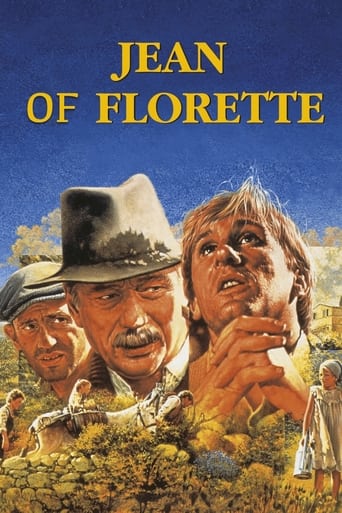minituttle
Rarely has a movie touched me so deeply! The characters are all very well played, the story is somewhat basic but sooo true, very far from all of today's Hollywood-style movies full of stunts and special effects.This movie made me travel through time and live in a decade I have not so well known.Watching it in its original version only made it better with the actors portraying their character's feelings and emotions to perfection.I highly recommend this movie to anyone who wants to have a good time, alone or with friends or family.Nice twist at the end of the second part (Manon of the springs) as well.Really, really worth watching in my opinion.
Jon Corelis
Jean de Florette and Manon of the Spring are more closely related than an original and sequel; they are really parts 1 and 2 of the same film, and in fact were filmed back to back.Set in Provence around 1920 (most people still use horses, donkeys and mules, but there are a few autos around; telephones exist but are rare, the mayor is very proud to have one), the first film tells of Jean de Florette (Gerard Depardieu,) a rather intellectual bourgeois civil servant from the city who, having inherited a farm in Provence, moves his wife Aimee (Élisabeth Depardieu, Gerard Depardieu 's real life wife at the time) and ten year old daughter Manon there, with the intention of applying scientific principles to raise vegetables and rabbits. But in the arid climate of Provence, everything depends on water: there is a plentiful spring on the property but Jean doesn't know it because his neighbors, local worthy Cesar "Le Papet" ("Gramps") Soubeyran (Yves Montand) and his rather dim nephew Ugolin (Daniel Auteuil) have blocked it up, hoping that the lack of water will cause the farm to fail, so they can buy it cheap. This tactic has tragic consequences for Jean's family. The second film recounts how ten years later Manon, now a beautiful young woman, finds both the spring and a way of revenge for what was done to her family. In the end, everyone gets more or less their just desserts.The films have an interesting history. French writer and director Marcel Pagnol, whose play Marius was latter turned into the French film trilogy Marius/César/Fanny, which was itself remade into the 1962 Hollywood film Fanny with Leslie Caron and other big stars, made a film in 1953, Manon des Sources, telling the second part of the story; his final cut of over four hours was so drastically cut by the distributor that Pagnol disowned it, and later redid the same story as a novel, adding a prequel novel, Jean de Florette; these two books together became the basis for these films.Jean de Florette and Manon of the Spring were a huge success both commercially and critically, and it's easy to see why. The Provencal settings are meticulously detailed and the landscape photography luscious. The acting is all around excellent: Gerard Depardieu and Yves Montand especially are as good as they've ever been.These films are not perfect works of art: they are not free of sentimentality, some viewers may occasionally be confused about exactly who some of the minor characters are, and the surprise ending ties together all the loose ends so neatly that it may see rather artificial. But these are minor flaws. All in all, this is a production that I think everyone will like: it's one of those rare films that leave you with memories that seem to be of people and places you've experienced rather than seen on a screen.
runamokprods
Two part film, that was 1st released as two separate features. Terrific telling of a complex story of intertwined farming families in rural France in the early part of the 20th century. The acting is mostly of the highest order. Yves Montand, one of the most suave men in history is completely believable as a rough hewn, self-centered farmer, Gerard Depardieu, also cast against type, as a gentle, educated city born man trying to make it as a farmer also is astounding. Almost as good is Daniel Auteuil as Montand's not-very-bright son. Only Emmanuelle Beart, gorgeous though she may be, doesn't quite convince me as the wild woman of the fields. Some of it is performance, some of it is how perfect she looks. The story is wonderful in a Dickensian sort of way, with clues and character elements showing up early, only to pay off three hours later. I love the first part even more, somehow it feels more truly tragic and dense, the 2nd part just a bit too neat by the end. But still a grand, intelligent, great looking entertainment.
billcr12
Gerard Depardieu is Jean de Florette, a simple, hard working landowner and farmer who grows and sells flowers and also raises rabbits for food. Some of Jean's neighbors would like to buy his land but Jean refuses to sell to them.They then find the main spring nearby and plug it with cement to prevent water from reaching the farm. Jean has to travel a good distance to carry large containers to his farm. He later gets badly injured and they take advantage of the situation quickly.This is a simple and slow moving drama which looks like a painting come to life. It is followed by the equally masterful "Manon of the Spring."




